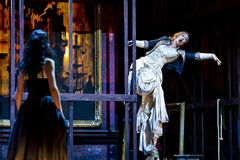| Opera Reviews | 25 April 2024 |
Göttingen presents Lotario with verve |
|
| Handel: Lotario International Handel Festival Göttingen May 2017 |
|
|
2017 is the turn of Lotario – just another everyday tale of dynastic and domestic politics, this time in the Holy Roman Empire. Berengario, having poisoned his co-ruler (and Adelaide’s husband) during the overture, wants her to marry his son, so that he becomes King of Italy. Adelaide is not having that at all. Rifail Ajdarpasic’s set is a cross between an artist’s studio – paintings, frames, paraphernalia litter the stage – and a grande salle with gilded cornicing above huge paintings of cities aflame. Between the two, there is the skeleton of walls and stairs, so that those on the interior passageways can observe and be seen, even hang over the rails and participate in the action. Director Carlos Wagner plays it more for the interpersonal than the international politics, with the characters trapped in the confined space till all is all worked through. Uneasy lies the head, and all that. The covered body of Adelaide’s late husband still lies beside the throne on which Berengario sits, in Thinker pose. Jorge Navarro Colorado’s light tenor contrasts with the dark tone of Ursula Hesse von den Steinen as his scheming wife Matilde. She’s a vamp, a femme fatale with embellished lapels, her white skirt hoicked up to reveal the trousers underneath. Caught between them is their son Idelberto, inexplicably attired in a long white nightgown. Countertenor Jud Perry is reluctant to do his parents’ bidding but does try to snuggle up to Adelaide, expressively sung by Marie Lys. Their voices are well matched, even if Adelaide receives his overtures stony-faced. She develops some sympathy for him, however, recognising that he is as much a victim of his parents as she is. To her rescue comes Lotario (Sophie Rennert) possibly more in love with Adelaide’s lands than with Adelaide. There is much play with ropes, as most of the characters end up bound at some point. And, the ex-husband being boxed up, there are plenty lilies and candles around, for feigning or willing death. These two combine to make the most stunning moment of the production – Lotario lying cruciform and singing Non disperi, peregrino, and Idelberto lipsynching the da capo part. So well-matched are their voices, and so perfect the lipsynching, that one watches for Rennert’s breathing to check it is really her voice. Every Handel opera has a factotum, and here it is Clodomiro, sung with authority by Todd Boyce. He warns of the dangers, takes messages from one to the other, gives the captured Adelaide the choice of marrying Idelberto or death. If there is any moral centre or good sense in the opera, he is it. Meanwhile, in the pit, Laurence Cummings directs the FestspielOrchester Göttingen with the usual verve for a production that, as the curtain falls, indicates that the whole cycle is about to begin again.
|
|
| Text ©
Catriona Graham Photo © Theodoro da Silva |

 The Göttingen International Handel Festival has made its aim to stage all of Handel’s operas before the 100th anniversary of the Festival – coming up in 2020 – and is now working through the last few less-performed works.
The Göttingen International Handel Festival has made its aim to stage all of Handel’s operas before the 100th anniversary of the Festival – coming up in 2020 – and is now working through the last few less-performed works.






